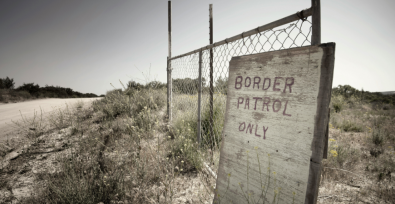Thirty years ago, the U.S. government officially launched the Prevention Through Deterrence policy at its southern border. This strategy is much like the one currently used in the European Union in places like Greece and North Africa. The approach, with its punitive immigration policies, ignores the humanity of migrants and undermines their right to freedom of movement, enshrined in international law. When people are robbed of their humanity and their rights are stripped away, exploitation and human trafficking flourish.
Disappearing into nowhere
The aim of the “deterrence policy” used by both regions is to force irregular migrants into having to travel such “hostile terrain” that the journey becomes too dangerous. Whether trying to cross the U.S. southern border by land or European borders by sea, the high risk of death discourages people from even trying. The reasons people leave home for somewhere else are endless. However, it often involves actual or threatened violence and exploitation in their home country. For people in desperate circumstances, deterrence policies don’t work. But this is increasingly leading to the deaths of men, women, and children in shocking numbers. A recent report by Amnesty International shone a light on the death toll at the U.S. border with Mexico through personal accounts from family members whose loved ones disappeared or died while attempting to join them in the U.S.
Wagner, a young man whose younger brother Rony was trying to make the crossing but disappeared, said:
“I can’t believe a person is lost just like that and disappears into nowhere. That can’t be possible.”
Wagner, who had done the trip himself, advised his brother that it was not easy. While explaining the risks, he warned, “This is not a game.” But despite his brother’s advice, Rony still didn’t make it.
Over the thirty years of the U.S. deterrence policy, migrant groups estimate somewhere between 10,000 and 80,000 people have died at the border. The migrants are mostly Brown, Indigenous, and Black people from Latin America.
With no safe options, deterrence won’t deter
Migrants are suffering on both sides of the border due to the deterrence policy. Leaving home and migrating to another location increases vulnerability to exploitation, criminality, and modern slavery. The people stuck on the Mexican side due to the broken, are systematically targeted by Mexican criminal groups and corrupt state officials. Violence and extortion are used to enrich criminals, smugglers, and kidnappers financially. For U.S. border agents tasked with carrying out inhumane policies, the callousness needed to do the job has sometimes led to moral injury and even suicide.
Rosa, a woman who was able to locate the remains of her 19-year-old cousin said the local sheriff told her:
“Here in Texas, no one is going to help, ma’am. That Border Patrol told you they were going to look for her, that is a lie. They don’t do it. . .The body was found because a rancher alerted us that the body was there. When did [Border Patrol] go to pick it up? Not until they got around to feeling like it.”
Currently, the U.S. Border Patrol provides families with little to no support to help them find their missing relatives or their bodies for burial. In fact, a coordinated official U.S. government response to those trying to locate missing people in the borderlands is simply non-existent.
Deterrence and punitive policies: two wrongs can’t make a right
The stories of missing loved ones all share a common thread — each person who tried to cross without authorization felt it was the only way to reunite with loved ones, achieve financial stability, or flee violence and seek safety. A deterrent approach coupled with punitive immigration policies is clearly not stopping desperate people with no safe legal channels for asylum or migration, from trying deadly paths.
Myrna and her husband Raúl who, after losing their 17-year-old son dedicated their lives to helping defend migrants’ rights said:
“I see what is happening at the border as so horrifying. We need to change the way immigrants are treated.”
Governments claim that tighter border controls and deterrence policies will help prevent human trafficking and modern slavery. But as we have seen, the opposite is true. Evidence shows that when people crossing borders are forced to take irregular routes, they engage in risky behavior. These dangerous practices put them at an even greater risk of exploitation due to having to circumnavigate tightly restricted borders through illegal means.
That’s why we are hosting an online panel event, Migration Politics that Kill: How governments exacerbate human trafficking. The purpose of the event is to expose the truth of how anti-trafficking narratives are being weaponized globally to justify denying asylum and protection from modern slavery, closing doors on immigration, and instead increasing migrants’ vulnerability to trafficking, exploitation, and death — all for political gain. Join us for the conversation and help us stop governments from hijacking the “anti-trafficking” narrative to legitimize their anti-migration policies.







Freedom United is interested in hearing from our community and welcomes relevant, informed comments, advice, and insights that advance the conversation around our campaigns and advocacy. We value inclusivity and respect within our community. To be approved, your comments should be civil.